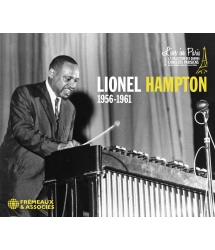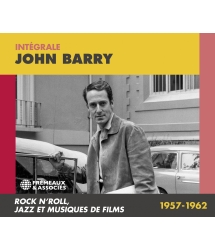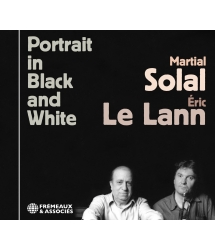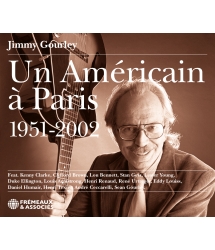- Notre Catalogue
- Philosophie
- Philosophes du XXème siècle et d'aujourd'hui
- Histoire de la philosophie (PUF)
- Contre-Histoire et Brève encyclopédie par Michel Onfray
- L'œuvre philosophique expliquée par Luc Ferry
- La pensée antique
- Les penseurs d'hier vus par les philosophes d'aujourd'hui
- Textes philosophiques historiques interprétés par de grands comédiens
- Histoire
- Livres
- Sciences Humaines
- Paroles historiques
- Livres audio & Littérature
- Notre Catalogue
- Jazz
- Blues - R'n'B - Soul - Gospel
- Rock - Country - Cajun
- Chanson française
- Musiques du monde
- Afrique
- France
- Québec / Canada
- Hawaï
- Antilles
- Caraïbes
- Cuba & Afro-cubain
- Mexique
- Amérique du Sud
- Tango
- Brésil
- Tzigane / Gypsy
- Fado / Portugal
- Flamenco / Espagne
- Yiddish / Israël
- Chine
- Tibet / Népal
- Asie
- Océan indien / Madagascar
- Japon
- Indonésie
- Océanie
- Inde
- Bangladesh
- URSS / Chants communistes
- Musiques du monde / Divers
- Musique classique
- Compositeurs - Musiques de film - B.O.
- Sons de la nature
- Notre Catalogue
- Jeunesse
- Philosophie
- Nouveautés
- Comment commander ?
- Recevoir le catalogue
- Manifeste
- Dictionnaire
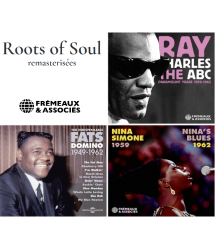

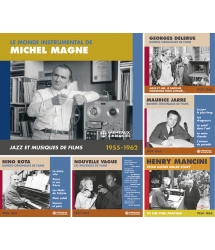








- Notre Catalogue
- Philosophie
- Philosophes du XXème siècle et d'aujourd'hui
- Histoire de la philosophie (PUF)
- Contre-Histoire et Brève encyclopédie par Michel Onfray
- L'œuvre philosophique expliquée par Luc Ferry
- La pensée antique
- Les penseurs d'hier vus par les philosophes d'aujourd'hui
- Textes philosophiques historiques interprétés par de grands comédiens
- Histoire
- Livres
- Sciences Humaines
- Paroles historiques
- Livres audio & Littérature
- Notre Catalogue
- Jazz
- Blues - R'n'B - Soul - Gospel
- Rock - Country - Cajun
- Chanson française
- Musiques du monde
- Afrique
- France
- Québec / Canada
- Hawaï
- Antilles
- Caraïbes
- Cuba & Afro-cubain
- Mexique
- Amérique du Sud
- Tango
- Brésil
- Tzigane / Gypsy
- Fado / Portugal
- Flamenco / Espagne
- Yiddish / Israël
- Chine
- Tibet / Népal
- Asie
- Océan indien / Madagascar
- Japon
- Indonésie
- Océanie
- Inde
- Bangladesh
- URSS / Chants communistes
- Musiques du monde / Divers
- Musique classique
- Compositeurs - Musiques de film - B.O.
- Sons de la nature
- Notre Catalogue
- Jeunesse
- Philosophie
- Nouveautés
- Comment commander ?
- Recevoir le catalogue
- Manifeste
- Dictionnaire
EVAN CHRISTOPHER
EVAN CHRISTOPHER
Ref.: FA8501
EAN : 3448960850124
Direction Artistique : DAVE KELBIE
Label : Frémeaux & Associés
Durée totale de l'œuvre : 1 heures 17 minutes
Nbre. CD : 1
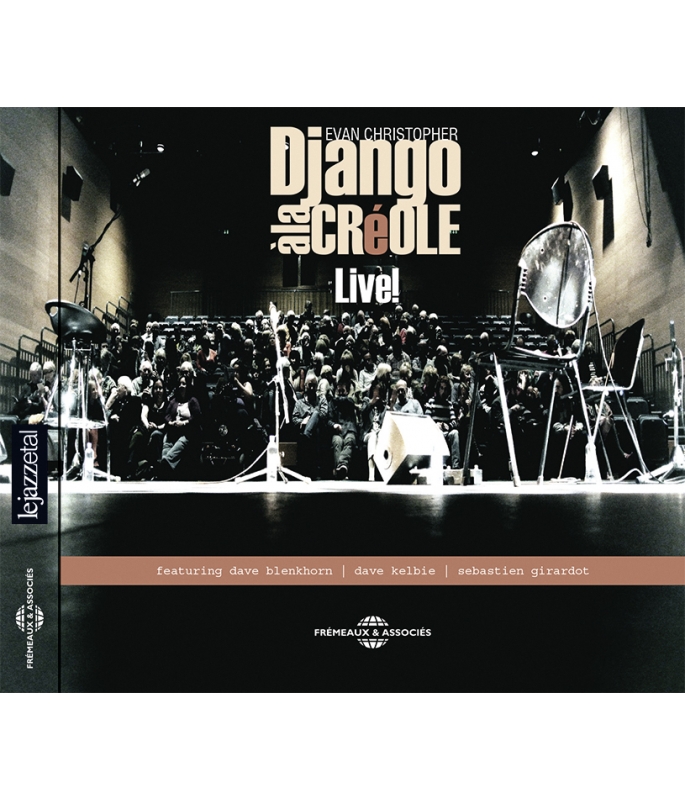
EVAN CHRISTOPHER
Plébiscitée par la presse comme par le public, la formation Django à la Créole, emmenée par Evan Christopher, sans doute le plus grand clarinettiste de jazz de la scène néo-orléanaise actuelle, décide à la fin d’une tournée mondiale triomphale, d’enregistrer un disque en public.
Un opus live semblait être une évidence tant la communion particulière avec le public permet de faire éclore un panel de couleurs et de saveurs musicales inouï.
Envolées swing, douceur et raffinement créole, apartés bossa se laissent ici découvrir et explosent en bouche comme un grand cru.
Une musique intime et généreuse où il n’est plus seulement question de jazz manouche et de jazz new orleans, mais dont le concept consiste à dépasser la notion de genre musical.
En effet, Django à la Créole est un genre à lui tout seul : celui d’un univers fantasque et coloré, situé entre Vieux Continent et Nouveau Monde, où sont combinées d’un côté des racines et des identités solidement ancrées, de l’autre le métissage, le plaisir de jouer de la musique et de la partager.
Augustin BONDOUX
Both the public and the critics have been won over by Django à la Créole, the group led by Evan Christopher, no doubt the greatest jazz clarinettist on today’s New Orleans scene.
Reaching the end of a hugely successful world tour, the band decided to record a live album that would show the rapport they’d created with audiences thanks to the extraordinary colour and savour of their music. And here it is.
Soaring swing, soft and elegant Creole excursions, sidesteps into bossa nova… its taste explodes in your mouth like a great wine.
The music is intimate and generous, and the band goes way beyond gypsy swing and the jazz of New Orleans: the concept here is to take music outside the notion of genres. In fact, Django à la Créole is a genre of its own: a fantastic universe of sound somewhere between the Old World and the New. Combining solid roots with crossbred identities and the simple pleasure of playing, this is music we can all share.
Augustin BONDOUX
« The other new live recording which provided a five-star listening experience and has stayed with me all year is Evan Christopher’s Django À La Créole Live! This band has been a Scottish jazz festival favourite for a few years now and, given the wild reactions it inspires in audiences, it’s little wonder it has released a CD of numbers recorded during its 2012 UK tour. As ever, clarinettist Christopher thrills with his dynamic, dramatic soloing and the exciting interplay with the superb lead guitarist David Blenkhorn. »
Alexander BRYCE – THE SCOTMAN
PRODUCTION : DAVE KELBIE POUR LEJAZZETAL
DROITS : LICENCIE A FREMEAUX & ASSOCIES
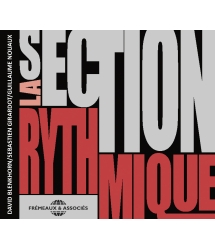
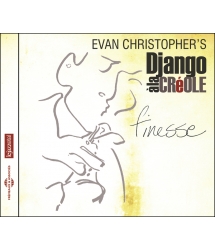
FINESSE
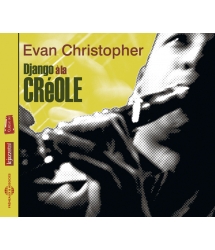
EVAN CHRISTOPHER
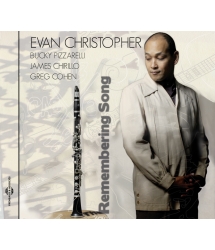
EVAN CHRISTOPHER




-
PisteTitreArtiste principalAuteurDuréeEnregistré en
-
1Douce AmbianceEvan Christopher - David Blenkhorn - Dave Kelbie - Sébastien Girardot00:07:122012
-
2Riverboat ShuffleEvan Christopher - David Blenkhorn - Dave Kelbie - Sébastien Girardot00:06:342012
-
3Dear Old SouthlandEvan Christopher - David Blenkhorn - Dave Kelbie - Sébastien Girardot00:09:052012
-
4One For The DukeEvan Christopher - David Blenkhorn - Dave Kelbie - Sébastien Girardot00:08:062012
-
5MamanitaEvan Christopher - David Blenkhorn - Dave Kelbie - Sébastien Girardot00:08:242012
-
6Solid Old ManEvan Christopher - David Blenkhorn - Dave Kelbie - Sébastien Girardot00:05:062012
-
7The MoocheEvan Christopher - David Blenkhorn - Dave Kelbie - Sébastien Girardot00:07:262012
-
8The CraveEvan Christopher - David Blenkhorn - Dave Kelbie - Sébastien Girardot00:05:532012
-
9FéerieEvan Christopher - David Blenkhorn - Dave Kelbie - Sébastien Girardot00:04:052012
-
10Manoir de Mes RêvesEvan Christopher - David Blenkhorn - Dave Kelbie - Sébastien Girardot00:06:272012
-
11Songe d'AutomneEvan Christopher - David Blenkhorn - Dave Kelbie - Sébastien Girardot00:09:192012
FA8501 Django à la créole live
EVAN CHRISTOPHER
Django à la CRéOLE
Live!
featuring dave blenkhorn | dave kelbie | sebastien girardot
Après avoir sorti les deux premiers disques d’Evan Christopher’s Django à la Créole, Claude Colombini et moi-même avons décidé en août 2012, d’aller rendre visite à Evan Christopher à la Nouvelle Orléans, car ce dernier fait partie des rares musiciens américains de renommée internationale à vivre encore à la Nouvelle Orléans. J’ai été saisi par l’extraordinaire vivier de création musicale qu’est resté cette ville, qui a été plusieurs fois meurtrie (Katrina en 2005, marée noire de 2010,…), que ce soit pour le jazz classique, la musique cajun, comme les fanfares hip-hop… En particulier sur Frenchman Street qui est à tous les égards, le lieu fantasmatique par excellence pour tout amateur de jazz.
La musique d’Evan Christopher, très élaborée, sophistiquée pour certains, représente un véritable travail de création. C’est sur place que j’ai véritablement compris la dimension intellectuelle de l’œuvre de l’artiste, qui associe à son travail de musicien, tout un pan de réflexion sur les différentes origines des musiques de la Nouvelle Orléans et la dimension sociale et culturelle qu’implique l’envie de la partager.
Evan Christopher m’a fait découvrir sa passion pour sa ville en m’emmenant à divers concerts, ou me faire interviewer sur la célèbre radio WWNOZ (immortalisée par la série Treme), mais aussi de nombreuses expositions, notamment le fonds de photos anciennes de l’histoire du jazz, présenté au NOMA (musée des Beaux-Arts de la Nouvelle Orléans, à la fois vitrine des cultures du monde à la Nouvelle Orléans, et de la culture de la ville à travers le monde). Au détour de cette exposition, il m’a confié combien de musiciens qui ont, exposée aux yeux du monde, la photo de leur grand-père, oncle, ou père, et qui ne viendront jamais dans ce musée, car étant le reflet d’une Amérique de la culture institutionnelle, réservée à l’élite !
Evan Christopher se veut « rassembleur » de culture et souhaite transmettre au plus grand nombre son goût pour l’histoire de la musique et l’histoire de sa ville et du multiculturalisme.
En tant que musicien, il dispose et ressens « aux tripes » l’héritage des musiciens du passé qui ont fait du jazz la plus grande musique du XXe siècle et en même temps il est le promoteur d’une vision académique, savante, voir muséographique, qui font l’épaisseur des grands musiciens.
Patrick Frémeaux
1 Douce Ambiance (Django Reinhardt) - Turner Sims Concert Hall 7’13
2 Riverboat Shuffle (Hoagy Carmichael/Irving Mills Dick Voynow) - Gwyn Hall 6’35
3 Dear Old Southland (Creamer and Layton) - Theatr Mwldan 9’05
4 One for the Duke (Johnny Hodges) - Gwyn Hall 8’06
5 Mamanita (Jelly Roll Morton) - Gwyn Hall 8’24
6 Solid Old Man (Rex Stewart) - The Plough Arts Centre 5’06
7 The Mooche (Duke Ellington/Irving Mills) - Gwyn Hall 7’26
8 The Crave (Jelly Roll Morton) - The Plough Arts Centre 5’53
9 Féerie (Django Reinhardt) - Theatr Mwldan 4’05
10 Manoir de Mes Rêves (Django Reinhardt) - Turner Sims Concert Hall 6’27
11 Songe D’automne (Archibald Joyce) - Theatr Mwldan 9’19
Evan Christopher - clarinettes
David Blenkhorn - guitare
Dave Kelbie - guitare
Sebastien Girardot - contrebasse
Evan Christopher’s Django à la Créole
LIVE
En 2007, la création de Django à la Créole a coïncidé avec des extraordinaires changements dans l’industrie musicale. L’obsolescence graduelle du CD et l’émergence de la distribution numérique ont changé la relation entre les artistes et leur public. La génération actuelle de musiciens considère la musique non plus comme un produit mais comme un service. Sincèrement, cela n’a jamais été un problème pour nous. Bien sûr, de nouveaux outils comme Facebook, Twitter et autres blogs ont modifié nos manières d’atteindre le public, mais pour nous, faire connaitre notre musique au plus grand nombre a toujours fait partie de notre engagement. L’idée de considérer des « fans », comme les clients de l’âge internet ne nous concerne pas et laissons cela à nos camarades dans la pop music. Le groupe a toujours travaillé pour la construction d’une communauté, rassemblée autour de l’envie de partager l’héritage musical de Django Reinhardt et de tous nos héros du jazz.
Notre premier disque montrait comment l’univers musical créole de la Nouvelle Orléans se mariait admirablement bien au jazz manouche de Django Reinhardt. Sur « Finesse », notre second album, nous avons continué cette exploration tout en l’amenant à un niveau encore plus abouti (David Blenkhorn passant à la guitare électrique). Ceci nous permit d’une part, de faire un parallèle avec la propre évolution musicale de Django, mais d’autre part de mettre un peu plus l’accent sur la notion d’improvisation collective (ultime marque de fabrique de la musique néo-orléanaise) et enfin, de focaliser notre travail sur l’héritage de Duke Ellington.
Si je devais définir le crédo musical de Django à la Créole, je le ferais en quatre mots : Duke Ellington, Louis Armstrong… et je vous garantis que Django, serait complément d’accord avec moi. J’ai en effet toujours souhaité que ma musique soit en quelque sorte un condensé de la dignité d’Ellington et de la volonté d’Armstrong de rendre les gens heureux. Ces deux monuments (tout comme Django) ont associé tellement de noblesse et de chaleur, de profonds sentiments et de puissance à leur musique et c’est ce dont nous nous efforçons de rendre compte à chaque concert. Voilà pourquoi la réalisation d’un troisième disque nous semblait évidente, et que la forme d’un live ne nous paraissait non seulement appropriée, mais nécessaire.
L’énergie et l’émotion provoquée par l’écoute « live » de ce groupe, suffit à expliquer pourquoi nous sommes toujours ensemble, après plus de sept ans. L’évolution musicale du groupe, comme celle de chaque musicien individuellement est pour nous très agréable à constater. C’est après une tournée au Japon et cinq semaines de concert à travers tout le Royaume-Uni et l’Irlande, nous avons décidé d’enregistrer nos quatre derniers concerts.
Nous avons choisi quatre types de lieux différents afin de capter une large variété d’énergies distinctes. Si l’on compare l’acoustique très travaillée du Turner Sims Concert Hall de Southampton à l’ambiance intime et « funky » du Plough Arts Centre de Great Torrington, nos performances ne sont pas les mêmes. Le Theatr Mwldan de Cardigan offre une acoustique complétement différente de celle du Gwyn Hall de Neath. Cela nous a permis de garder beaucoup de fraîcheur dans notre jeu et de laisser place à quelques imprévus, qui n’auraient probablement pas eu lieu si nous avions enregistré cet album durant une résidence de quatre jours. “Evan Christopher’s Django a la Creole, LIVE” reprend quelques uns de nos titres déjà enregistrés, mais contient également des nouveautés. L’ordre des titres est ici calqué sur celui de nos setlists de concert.
Le fait que l’on retrouve ‘Douce Ambiance’ dans la plupart des concerts voués à Django, en fait un titre d’ouverture cocasse, ceci au regard de la manière dont nous détournons l’œuvre. Nous nous sommes assurés de conserver en substance suffisamment d’éléments issus de la composition de Reinhardt afin de satisfaire les aficionados de Django, tandis que nous y ajoutons le tempo sensuel et la «teinte espagnole», que Jelly-Roll Morton présentait comme la source du jazz. De plus, ce titre est représentatif de notre aventure musicale.
D’ordinaire, après avoir commencé avec un Django créolisé, nous aimons ensuite Djangoiser un classique du jazz néo-orléanais. Sur cette version live de ‘Riverboat Shuffle’ de Hoagy Carmichaels, le quartet se lâche et s’amuse tout simplement, un élément qui fait cruellement défaut à beaucoup de concerts de « jazz » de nos jours.
Ensuite, nous offrons notre version des fameuses « jazz funérailles » de la Nouvelle-Orléans. Comme le dit l’un de mes collègue : « A la Nouvelle Orléans, nous avons mis du “FUN” dans les funérailles ». Irrévérencieux, certes, mais vrai. Nous libérons l’esprit du défunt à l’aide de musiques entraînantes et de danses.
Les compositeurs Turner Layton et Henry Creamer ont mélangé deux spirituals Sometimes I Feel Like a Motherless Child’ et ‘Deep River’ pour créer ‘Dear Old Southland’. Nous reprenons ici l’ordre d’une procession : tout d’abord nous interprétons ce thème comme un cantique religieux, puis à la manière des vieilles fanfares, qui suivent le cercueil de l’église jusqu’au cimetière, pour enfin déboucher sur le rythme effréné de la parade qui part du cimetière pour retourner à la ville, où une réception à l’honneur du mort est donnée. Afin d’y maintenir la présence de Django, notre procession se termine dans un style très « Hot Club », avec un swing du tonnerre.
J’ai toujours été fasciné par ‘One For the Duke’ et ses harmonies insolites entre les deux voix. Probablement influencé par ‘Ko-Ko’ le grand classique d’Ellington, nous apposons un traitement bluesy à la chanson (ce qui amplifie le groove) et des solos emplis d’audace. L’influence de musiciens plus contemporains, comme mon mentor Tony Scott, ou de guitaristes comme Wes Montgomery est sans doute évidente, mais nous nous efforçons avant tout (et y mettons un point d’honneur) à être mélodiques.
Adapter les partitions de Jelly-Roll Morton, toutes empruntes de la syncope haletante typiquement néo-orléanaise, constitue un vrai défi. Comme le premier instrument était la guitare, nous nous disions que de toute façon, il s’en moquait… Il aura fallu quelques tâtonnements, mais nous avons essayé d’inclure à notre version de ‘Mamanita’ tous les éléments que Morton qualifiait d’essentiels dans le jazz : les pauses chaudes, les riffs, et toute une influence musicale allant du blues à l’opéra, des changements d’atmosphères dynamiques et, bien sûr « beaucoup de rythme ... [avec] ... beaucoup de swing. » [“plenty of rhythm... [with] ...plenty swing.”]
‘Solid Old Man,’ est un titre de blues que Django Reinhardt a enregistré avec des musiciens de Duke Ellington, dont faisait partie le clarinettiste néo-orléanais Barney Bigard, et qui laisse la part du lion à Sébastien Girardot. Depuis que je l’ai rencontré, il y a 10 ans maintenant, j’ai toujours défendu et encouragé son jeu. Je me plais à penser que c’est grâce à ce quartet que son style a pris de l’ampleur. J’apprécie également le fait que, même sans batterie, nous avons un formidable panel de rythmes et de textures musicales. Par ailleurs, des grooves comme le “shuffle” de Dave Kelbie ont mis du temps à se mettre en place, mais le jeu en vaut largement la chandelle.
En parlant de groove, notre version “africaine” du classique de Duke Ellignton ‘The Mooche’, est un voyage exaltant. Notre interprétation est d’ailleurs beaucoup plus influencée par la version live de 1940 dans « Duke Ellington at Fargo » que par la version studio de 1929.
‘The Crave’ est une nouveauté dans notre répertoire. Là encore, le groupe interprète à sa manière l’œuvre pour piano de Jelly-Roll Morton. Dans une interview réalisée pour la Library of Congress en1938 par Alan Lomax, Morton avait démontré pourquoi ‘Mamanita’ et ‘The Crave’ étaient ses œuvres les plus représentatives de la syncope latine, la source créole du jazz de la Nouvelle Orléans. ‘The Crave’ est par ailleurs, devenu célèbre depuis qu’il a fait partie de la musique du film La légende du pianiste sur l’océan de Giuseppe Tornatore.
Dans la plupart de nos concerts, nous aimons coupler la fougue de ‘Féerie’ avec ‘Manoir de Mes Rêves’ musique plus introspective. Composées toutes deux au début des années 1940, elles démontrent toute la sophistication du jeu de Django et l’influence des musiques classiques et modernes sur le jazz. Le solo de David Blenkhorn, qui emprunte au bolero cubain, est l’un des plus formidable moments de cet album.
Pour conclure l’album, nous avons choisi le titre qui nous est le plus souvent demandé. Enregistré au début des années 1940, ’Songe d’Automne’ est probablement mon morceau préféré de Django Reinhardt (on y retrouve le clarinettiste Hubert Rostaing). Ce titre était à l’origine une valse, composée en 1908 par Archibald Joyce. Nous l’interprétons ici à la manière d’une samba brésilienne. Nous pouvons entendre le public reprendre le refrain en chœur, comme si nous entendions une parade de carnaval au loin.
D’une certaine manière, ce projet nous a tous fait revêtir l’habit de musicologues en herbe. Toutes les études et attentions particulières aux pratiques rythmiques font que Django à la Créole se distingue de nombreuses formations du genre. ‘Songe d’Automne’ en est un très bon exemple. En effet, on peut y entendre Dave Kelbie troquer sa guitare contre un chocalho, Sébastien Girardot jouer les accentuations typiques du « surdo » (percussion brésilienne), Dave Blenkhorn imiter le cavaquihno et moi-même la cuica avec ma clarinette.
Cette manière de considérer les choses, n’est pas seulement un exercice de style, nous trouvons important de faire partager cette connexion à notre public. J’ai toujours soutenu qu’en raison de son caractère unique, la musique de la Nouvelle Orléans devait être perçue comme une « musique du monde ». Par ailleurs, la « créolité» de notre projet n’embrasse pas la seule créolité néo-orléanaise, mais incorpore toutes les merveilleuses musiques ayant une ascendance d’essence africaine. Django à la Créole souligne l’importance d’avoir un solide ancrage dans les racines musicales, non pas pour la sauvegarde de patrimoines culturels authentiques, mais afin d’être en mesure d’illustrer les valeurs les plus universelles et élémentaires que l’on retrouve dans la manière de faire de la musique. Peu importe si vous vous identifiez comme Manouche, Néo-orléanais, Français, Britannique, Japonais, Noir ou Blanc… Partout où nous sommes invités à jouer, nous voyons l’expérience musicale à venir comme une célébration de la créativité, de la communion et de la synergie avec notre public.
J’espère que cette intention transparait dans les titres live que vous pouvez écouter sur ce disque. Et comme je dis à la fin de nos concerts : « Si vous avez eu au moins la moitié de plaisir à nous écouter que nous en avons à jouer, alors, notre spectacle était un succès,… parce que nous, nous nous y sommes éclatés ! »
Evan Christopher
© FRÉMEAUX & ASSOCIÉS 2014
Evan Christopher’s Django à la Créole LIVE
The creation of Django à la Créole in 2007 coincided with remarkable changes in the music industry. Digital distribution and the gradual obsolescence of the compact disc has changed the relationship between artists and people following their music as the current generation of musicians has the expectation to regard music as a service more than a product. But, frankly, this has never been a real problem for us. Sure, newer tools like Facebook, Twitter and blogging have changed how we can reach people, but our music has always been about engagement and trying to connect with people. So, the idea of “fans as consumers in the Internet age? Well, that’s for our brethren in the “pop” music world, not us. This band has always worked toward building a community and sharing the musical legacy of not only Django Reinhardt, but all of our jazz heroes.
Our first self-titled CD introduced how the musical worlds of New Orleans and le monde Créole could be combined with the Gypsy swing pioneered by Django Reinhardt. The next CD, “Finesse,” continued this exploration but brought the ensemble interplay to a higher level with David Blenkhorn changing to electric guitar. This allowed us to parallel Django’s own musical evolution, better exploited the New Orleans hallmark of collective improvisation, and helped foreshadow our attentions to the legacy of Duke Ellington.
This is actually very important, because if I had to define Django à la Créole’s musical mission, I could do it in four words: Duke Ellington, Louis Armstrong. Furthermore, I can say with confidence that Django, our namesake and inspiration, would approve. See, I have always wanted my music, and this band as well to exemplify Ellington’s dignity and Armstrong’s commitment to making people happy. These two giants, and Django too for that matter, combined nobility with heat, deep feeling with virility. This is what we strive to express in our presentations and why a third CD was actually quite easy for us to imagine, but why recording the band live seemed not only appropriate but necessary.
The energy and emotion of hearing this group “live” is why we are still together after seven years, and for me, the band’s development as well as the growth of the individual musicians has been a joy to watch. After nearly five weeks of touring that started with our return to Japan and several concerts throughout Ireland and the UK, we decided to professionally record our last four concerts. We chose four different types of performance spaces to get a variety of energies. The band performs differently in the acoustically glorious Turner Sims Concert Hall in Southampton, than the intimate and ‘funky’ Plough Arts Centre in Great Torrington. Cardigan’s Theatr Mwldan offered a very different acoustic compared to Neath’s Gwyn Hall. For us, it keeps the music much fresher and leaves room for the unexpected than if we used the same room over four evenings. “Evan Christopher’s Django a la Creole, LIVE” reprises a few previously recorded pieces, but there are also some new ones. The tracks herein have been programmed much like one of our concerts.
The ubiquity of ‘Douce Ambiance’ in Django-centric programs makes it a fun opener for us because of the ways in which we have disguised it. We made certain to retain enough of the requisite compositional elements from Reinhardt’s performances aim to satisfy Django aficionados, while the sultry tempo and the “Spanish tinge,” that Jelly-Roll Morton felt was the essence of jazz, and, provide the sense that a musical adventure is underway.
Usually, after opening with a “Creolized” Django tune, we like to “Django-ize” a hot New Orleans number. This live version of ‘Riverboat Shuffle’ composed by Hoagy Carmichael finds the quartet loose and simply having fun, an element we feel is often sorely lacking in many “jazz” performances today.
Next, we offer impressions of a jazz-funeral procession. As a colleague of mine says, “New Orleans: We put the “FUN” in “Funeral.” Irreverent, but true. The celebratory “Second Line” tradition does not allow grief to hold the spirit of the departed earthbound. Rather, with life-affirming music and dance, we free the spirit. Composers Turner Layton and Henry Creamer combined two spirituals, ‘Sometimes I Feel Like a Motherless Child’ and ‘Deep River’ to create ‘Dear Old Southland’.We develop the themes to signify the hymn in the church, then the hymn played as a traditional brass band sashays down the street to the cemetary, and the uptempo parade back to town for a reception honoring the deceased. To maintain Django’s presence, our procession ends with a Hot Club style band swinging to the rafters.
I have always been fascinated by ‘One For the Duke’ and its quirky harmonies between the two voices. Possibly from a minor strain in an up-tempo Ellington number called ‘Ko-Ko,’ the song gets a bluesy treatment from us, with a deep groove and daring solos all around. Influence of more modern musicians such as my mentor Tony Scott or guitarists such as Wes Montgomery may be evident, but the high value we place on melodicness stays evident.
Adapting Jelly-Roll Morton’s solo piano pieces that exploit the infectious syncopations of the New Orleans style have been a fun challenge, and since his first instrument was guitar, we think he wouldn’t mind. It took some tinkering but, in our version of Morton’s ‘Mamanita’ we try to include all the elements that he said were essential to jazz including hot breaks, riffs, influence from everything from blues to opera, dramatic dynamic changes, and of course “plenty of rhythm... [with] ...plenty swing.”
‘Solid Old Man,’ a blues number among the tracks recorded by Reinhardt with Ellington sidemen including New Orleans clarinetist Barney Bigard, is always a good feature for Sebastien Girardot. I have championed his bass playing since I met him over a decade ago, and I like to think that this quartet is one of the reasons he has grown so much musically. I also love how, without drums, we get a fantastic pallet of diverse rhythms and textures. Grooves like Dave Kelbie’s “shuffle” here took time to develop, but it has been well worth the effort.
Speaking of grooves, our “African” version of Duke Ellington’s classic, ‘The Mooche,’ makes an exciting journey. Our rendition is more influenced by a 1940 version of Duke’s band at a dance in Fargo, North Dakota, than his original studio versions from 1929.
A newer addition to our repertoire is ‘The Crave.’ Again, the band translates one of Jelly-Roll Morton’s solo piano pieces to our instrumentation. Morton demonstrated the “Spanish tinge” with both ‘Mamanita’ and ‘The Crave’ in his 1938 interview with Alan Lomax for the Library of Congress, but ‘The Crave’ became more well-known after it was featured in the film, “The Legend of 1900.”
Many of our shows pair the torrid swinger ‘Féerie’ with the introspective ‘Manoir de Mes Rêves.’ Composed in the early 1940’s, they illustrate Django’s sophistication and influence from both modern classical music and evolving trends in jazz. As in most of our concerts, David Blenkhorn’s solo on the ballad turned Cuban bolero is an exceptional highlight of this live set.
To close the CD, we chose one of our most requested numbers. ‘Songe d’Automne’ is probably my favorite recording by Django’s hard-swinging group in the 1940’s that featured clarinetist Hubert Rostaing. It was originally a waltz hit for composer Archibald Joyce in 1908, but we think it works well as a Brazilian Samba. Listen closely, and you can even hear our audience singing in the “chorus” like a “Carnaval” parade in the distance.
In some ways, this project has turned us all into musicologists to some extent. Study and attention to rhythmic details, is another way that Django à la Créole distinguishes itself from most groups in this genre. ‘Songe d’Automne’ is a good example. There’s Dave Kelbie’s relentless chocalho shaker rhythm and Sebastien Girardot’s distinct accent like the sordu. On top of that, Dave Blenkhorn lays down his Brazilian guitar part even switching to his upper register to imitate the cavaquinho. Even the coda finds my trying to approximate the cuica or ‘monkey drum’ by using only the upper half of the clarinet.
This study isn’t just pedantry at my behest, it’s an important way that we connect to this material and attempt to share this connection with our audiences. I have always contended that because of its uniqueness, New Orleans music is best approached as a “world music.” Furthermore, the “créolité” of our project intentionally goes beyond New Orleans and embraces many wonderful musics united by the ancestral African “clavé.” Django à la Créole emphasizes the value of having a solid foundation in the roots of the music, not only for the sake of cultural authenticity but to illustrate the most compelling universal aspects of music-making. You see, it doesn’t matter if you identify yourself as Manouche or New Orleanian; French, British or Japanese; black or white or whatever. Anywhere we are invited to perform, we believe in the musical experience as a celebration of community and creativity, soul and synergy.
I hope this intent is evident in the live tracks captured here, and that they bear repeated listenings. As I often say at the close of our shows, “If you had just half as much fun listening as we did performing for you, than our performance was a success,… because we had a blast!”
By Evan Christopher
© FRÉMEAUX & ASSOCIÉS 2014
RECORDING INFORMATION
Evan Christopher - clarinettes
David Blenkhorn - guitare
Dave Kelbie - guitare
Sebastien Girardot - contrebasse
Recorded on tour in the UK 24/26/27/28 October 2012
Engineered by Dylan Fowler
Mixed at Stiwdio Felin Fach 17/18/19 December 2012, 09/10/11 January 2013, 11/12 February 2013
Mastered at Stiwdio Felin Fach 13 February 2013
Special thanks: To all the venues in the almost five-week tour of September/October 2012 which led up
to this recording. Very special thanks to the four venues and audiences in which we recorded.
To John Etheridge for the loan of his 1954 Gibson L7.
Licensed to GROUPE Frémeaux Colombini SAS (Artistic director: Augustin Bondoux)
Manufactured and distributed by Frémeaux & Associés.
PHOTO CREDITS
Empty stage - Peter Crann 2012 (Booklet front)
On stage, Spielgeltent, Edinburgh International Jazz & Blues Festival: Sebastien Girardot, 21/07/2013 (Inlay Back)
On stage, Gwyn Hall: Paul Nicholas 25/10/2012 (Under the CD)
VENUES
24/10/2012 Theatr Mwldan, CARDIGAN, Wales
www.mwldan.co.uk
3. Dear Old Southland
9. Féerie
11. Songe D’automne
25/10/2012 Gwyn Hall, NEATH, Wales
www.gwynhall.com
2. Riverboat Shuffle
4. One for the Duke
5. Mamanita
7. The Mooche
26/10/2012 Turner Sims Concert Hall,
SOUTHAMPTON, England
www.turnersims.co.uk
1. Douce Ambiance
10. Manoir de Mes Rêves
27/10/2012 The Plough Arts Centre,
Gt Torrington, England
www.theploughartscentre.org.uk
6. Solid Old Man
8. The Crave
Plébiscitée par la presse comme par le public, la formation Django à la Créole, emmenée par Evan Christopher, sans doute le plus grand clarinettiste de jazz de la scène néo-orléanaise actuelle, décide à la fin d’une tournée mondiale triomphale, d’enregistrer un disque en public. Un opus live semblait être une évidence tant la communion particulière avec le public permet de faire éclore un panel de couleurs et de saveurs musicales inouï. Envolées swing, douceur et raffinement créole, apartés bossa se laissent ici découvrir et explosent en bouche comme un grand cru. Une musique intime et généreuse où il n’est plus seulement question de jazz manouche et de jazz new orleans, mais dont le concept consiste à dépasser la notion de genre musical. En effet, Django à la Créole est un genre à lui tout seul : celui d’un univers fantasque et coloré, situé entre Vieux Continent et Nouveau Monde, où sont combinées d’un côté des racines et des identités solidement ancrées, de l’autre le métissage, le plaisir de jouer de la musique et de la partager.
Augustin BONDOUX
Both the public and the critics have been won over by Django à la Créole, the group led by Evan Christopher, no doubt the greatest jazz clarinettist on today’s New Orleans scene. Reaching the end of a hugely successful world tour, the band decided to record a live album that would show the rapport they’d created with audiences thanks to the extraordinary colour and savour of their music. And here it is. Soaring swing, soft and elegant Creole excursions, sidesteps into bossa nova… its taste explodes in your mouth like a great wine. The music is intimate and generous, and the band goes way beyond gypsy swing and the jazz of New Orleans: the concept here is to take music outside the notion of genres. In fact, Django à la Créole is a genre of its own: a fantastic universe of sound somewhere between the Old World and the New. Combining solid roots with crossbred identities and the simple pleasure of playing, this is music we can all share.
Augustin BONDOUX
CD Django à la créole live, Evan Christophe r© Frémeaux & Associés 2014.
ARTICLES =
COMPTE RENDU DE CONCERT PAR FRANCIS COUVREUX – DJANGOSTATION.COM
COMPTE RENDU DE CONCERT PAR CLIVE DAVIS – TIMES
« They made it by the skin of their teeth. After taking the Eurostar from a gig in Paris, the clarinettist Evan Christopher and his inspired chamber quartet, Django à la Creole, dashed into the Colston Hall’s Lantern venue and set about playing after a minimalist sound-check. They looked a little weary — no surprise since they’d been on the road for so long — yet the music floated effortlessly. Christopher’s drummer-less fusion of Hot Club swing with New Orleans’s famed “Spanish tinge” produces sotto voce dialogues of the highest quality. With a new live album to promote, and with the Crescent City guitarist and banjo player Don Vappie sitting in alongside the rhythm guitarist Dave Kelbie and the bassist Sebastien Girardot, the quartet unleashed a set that climaxed with Duke Ellington’s The Mooche. Old music, yes, but when it is played with so much spirit and intelligence, everything becomes utterly timeless. Christopher’s soloing blends raw blues with flourishes of grand opera. Jelly Roll Morton would have loved it. A very different New Orleans tradition was on display in the main hall later when the wisecracking drummer Zigaboo Modeliste led his band through a cheery set of funk work-outs spiced with Meters riffs. »
COMPTE RENDU DE CONCERT PAR LONDON JAZZ NEWS
« If there is a better living exponent of the New Orleans Creole clarinet style than Evan Christopher, then it’s a discovery I have yet to make. He has the big, woody tone of a Bechet, the control of glissandi of a Bigard, the filigree decorative skills of an Albert Nicholas, the warmth of a Jimmie Noone, and the fire of an Ed Hall. And yet, he always sounds like himself. On pieces such as Jubilee or One for the Duke he proved his credentials as a peerless performer in this idiom. The Quecumbar gig was the UK launch of the third album by the band Django À La Creole, which takes the common ground between traditional New Orleans music and Django’s manouche guitar as its starting point. The summit meeting between Bigard and Django Reinhardt in May 1939 is a good launch pad for understanding the development of this group’s music. Two of the tracks from that session were included in this concert, a feature for bassist Sébastien Girardot “Solid Old Man” and a blistering solo vehicle for Christopher “I Know That You Know”. On previous tours, the Australian guitarist David Blenkhorn has assumed the Django role, with just enough of Reinhardt’s plangent acoustic sound combined with a fleeter amplified guitar tone to evoke early ‘50s Django. For this brief UK visit, his place has been taken by the New Orleans string specialist Don Vappie. As a result the group is slightly differently balanced from its earlier incarnation. Vappie is a fine guitar soloist with a post-Charlie Christian vocabulary, but his forays into the Reinhardt area sounded rather like latterday Al Casey (the ex-Fats Waller guitarist who heard Django in New York and changed his style accordingly). The overall results are definitely more Bourbon Street than Montmartre. That’s not a bad thing, and Vappie’s vocal reinterpretation of the Creole Song “Salée Dame”, complete with banjo solo, and with Christopher nodding in the direction of Albert Nicholas, was a joy. Rhythm guitarist Dave Kelbie and Girardot set up an infectiously lilting backing, A vocal version of “Buddy Bolden Blues” would also have gone down well in the Crescent City, not least for Christopher’s complete avoidance of cliché. He is a study in concentration when he plays, but the results are simply brilliant. His control of dynamics, nuance and tone are extraordinary, and he projects this onto the group, notably in a version of “Riverboat Shuffle” that included intricate unison passages with Vappie and sharp contrasts in volume between one section and the next.
The band has hit upon a winning formula, and sustained it through a major change in personnel. Its eponymous theme, a reworking of Reinhardt’s “Improvisation No, 3”, brings the Latin Creole lilt together with Reinhardt’s melodic gift. The most attractive, and unexpected, success of the evening was “Tropical Moon” from Sidney Bechet’s unusual Haitian Orchestra session of 1939. The original pieces by this quintet were by no means great records, but Evan Christopher’s lyrical exploration of this song showed the wonderful depth of music lurking in those largely forgotten 78s. »
COMPTE RENDU DE CONCERT PAR IAN MANN - THE JAZZ MANN
« Evan Christopher’s Django a la Creole, Huntingdon Hall, Worcester, 08/03/2014.
The progress of clarinettist Evan Christopher’s Django a la Creole project has been well documented on the Jazzmann web pages. Born in Los Angeles Christopher made New Orleans his home for a number of years before moving to Paris in the wake of the destruction caused by Hurricane Katrina. However Christopher’s years in New Orleans cemented his profound affection for the music of the Crescent City, a love that finds its expression in Django a la Creole’s recordings and performances.
Django a la Creole made its live début in 2007 and the group has since recorded three albums “Django a la Creole” (2008) “Finesse” (2010) and the recently released “Live!”(2014). This latest instalment was recorded at four different venues at the end of the group’s 2012 UK tour and follows a similar format to the brilliant performance I saw in the intimate confines of the Shrewsbury Coffeehouse just a few days before the actual recording. All three albums are highly recommended as are the group’s live performances which combine great playing with informed and entertaining comment on the music involved. A performance by Evan Christopher is both an entertainment and an education.
Following the recent flooding in the UK it was great to get and see some live music once again. I’d been forced to abandon planned trips to Abergavenny, Shrewsbury, Birmingham and even nearby Presteigne due to the weather so it was perhaps a touch ironic that the first gig I went to in what seemed like ages should be in Worcester, a city particularly badly afflicted by the recent deluge. I’m pleased to report that life in the city is now back to normal and that Huntingdon Hall itself appeared to be unscathed. The venue is a converted church with an excellent acoustic and I’ve seen a number of memorable performances here over the years, mainly in the jazz and folk genres although the Hall also presents other types of music from rock to classical plus comedy and theatre. A genuine across the board arts centre it is largely staffed by a band of loyal volunteers. And while we’re talking of Worcester let’s hope the County Cricket Club manages to repair the damage done to the pitch by the recent flooding before the start of the new season.
I had originally intended to combine a review of tonight’s show with a look at the recent live album. My thanks to rhythm guitarist Dave Kelbie for furnishing me with a copy of the album and also for putting my wife and I on the guest list for tonight’s show. However tonight’s performance was so substantially different I feel that it’s probably best if tonight’s gig and the album are treated as separate entities. The reason for this change of heart is the result of a significant line up change. Christopher, Kelbie, double bassist Sebastien Girardot and lead guitarist Dave Blenkhorn have constituted the group since the beginning but for this tour Blenkhorn has been replaced by the remarkable Don Vappie, a multi instrumentalist and vocalist from New Orleans.
Vappie not only plays convincing lead guitar in this context but is also a highly accomplished banjo player who has recorded a number of albums on the latter instrument. He’s played bass with Wynton Marsalis and is also a more than useful vocalist. Christopher and Vappie played regularly together in New Orleans before the clarinettist moved to Paris. Vappie remained in his native city where he performs regularly with his own jazz orchestra, the Creole Jazz Serenaders.
Vappie’s inclusion adds extra authenticity to the Creole part of the equation but one shouldn’t under estimate the influence of the great Django Reinhardt. As I’ve observed in earlier articles about this project there’s still a lot of Reinhardt influenced music around but none of the many gypsy jazz groups sound quite like Django a la Creole. Christopher’s group is one of the most distinctive Reinhardt inspired groups around and adds a contemporary, often exotic twist to the Reinhardt legacy through the use of Latin and Brazilian rhythms.
Although tonight’s performance included several items from the quartet’s albums the presence of Vappie cast the music in a new light, particularly so with Vappie’s banjo and voice increasing the range of sounds available to the group. Tonight’s show was also notable for being virtually all acoustic, Vappie deployed a small amp but the other three members were essentially unplugged with the acoustics of the hall ensuring that all four were clearly audible and with the sound particularly well delineated. I don’t think I’ve heard Kelbie’s rhythm lines in such sharp definition before.
Vappie, Kelbie and Girardot took to the stage first with Christopher making something of a grand entrance as the quartet opened with “Linger A While”with solos from Christopher on clarinet, Vappie on guitar and Girardot on double bass, his use of the slap technique frequently adding to the music’s rhythmic drive. This was the group’s second gig of the day following a lunch time appearance at a well attended jazz festival at Colston Hall, Bristol, this following a delayed overnight trip on the Eurostar following a show in Paris – and yet they showed no signs of tiredness. Instead they exuded a genuine sense of fun allied to a sense of discovery as they explored the possibilities of this new international configuration featuring two Americans, the English Kelbie and the Franco/Australian Girardot.
Christopher’s love of his source material is expressed both in his playing and in his instructive comments on the music throughout a performance. Each tune is introduced with both background information as to its provenance and further explanation with regard to the group’s interpretation of it. The listener learns a lot at an Evan Christopher show, he’s a fine educator and a good ambassador for this music. The group continued with Reinhardt’s “Douce Ambiance”, the composition that opens the recent live album. Christopher explained how he liked to “Creolize” Reinhardt’s tunes, in this case adding the Cuban habanera rhythm to achieve something of Jelly Roll Morton’s famous “Spanish Tinge”.
Of course the process also works in reverse, Christopher also likes to “Django-ize” New Orleans tunes, in this case a lively version of Hoagy Carmichael’s “River Boat Shuffle with Kelbie’s breakneck rhythms fuelling solos from Christopher on clarinet, Vappie on guitar and an extensive feature from Girardot on elaborately slapped bass.
The next item saw a radical departure for the group with Vappie switching to banjo to sing the Creole song “Salee Dame”, a piece that originally appeared on the 1940’s recording “Jazz A La Creole” featuring clarinettist Albert Nicholas, bassist Pops Foster, drummer Baby Dodds and others.
The sung verses alternated with instrumental solos by Christopher on clarinet and Vappie on banjo.
Kelbie described Vappie’s banjo playing as “funky” but it’s much more than that. He’s a brilliant player on this often maligned instrument and his playing of it in the second set was frequently jaw dropping. He’s no slouch on the guitar either and it’s remarkable to think that he may consider the guitar as his second, or even third instrument.
Introducing the next tune Christopher told us of Django Reinhardt’s meeting with the Duke Ellington band in Europe in 1938. Reinhardt subsequently recorded with members of the Ellington band including trumpeter Rex Stewart and clarinettist Barney Bigard, the latter a major inspiration for this project. Stewart’s tune “Solid Old Man” is a popular item in the repertoire of the Christopher group, here something of a feature for the excellent Girardot who demonstrated his fluency as a soloist without recourse to the slapping technique as Kelbie provided the necessary rhythmic drive.
“Mamanita” was an arrangement of a solo piano piece by Jelly Roll Morton with a renewed focus on Morton’s “Spanish Tinge” through the inclusion of clave and habanera rhythms as Christopher and Vappie enjoyed a series of scintillating clarinet and guitar exchanges.
The first set concluded with a rousing version of Reinhardt’s “I Know You Know”, originally a celebration of the shared language of jazz featuring the European Reinhardt and the American Bigard. Vappie’s solo guitar intro gave way to Kelbie’s ferocious rhythmic drive and Christopher’s solo also evoked the spirit of Jimmie Noone. Vappie returned for another fleet fingered guitar feature and Girardot also featured before Christopher played us out with a second solo, complete with quote from “Swanee River”.
Set two began rather incongruously with “The Farewell Blues”, originally by the New Orleans Rhythm Kings and later recorded by Coleman Hawkins and Benny Carter. Here we heard suitably hot solos from Christopher on clarinet, Vappie on guitar and Girardot on slapped bass.
A marvellous version of “Buddy Bolden’s Blues” (aka “Funky Butt”) featured Vappie’s voice and banjo. His banjo solo was a real tour de force, I’ve never seen this instrument, often the butt of musicians’ jokes, played so brilliantly, except perhaps by Eugene Chadbourne or Bela Fleck. However compared to the post modern approach of these guys Vappie’s playing stays much closer to his New Orleans source, even allowing for a quote from Scott Joplin’s “The Entertainer”.
The music of Sidney Bechet is another touchstone from Christopher. From the album “Finesse” came “Tropical Moon” in an arrangement that incorporated the merengue and habanera rhythms of Haiti. Members of the audience could be seen swaying in their seats as they enjoyed solos by Christopher on clarinet and Vappie on guitar.
Reinhardt’s “Manoir de Mes Reves”, often known as “Django’s Castle” was written in the 1940’s and revealed the influence of modern classical music, particularly that of Ravel and Debussy, upon the composer. Christopher’s arrangement combines Reinhardt’s balladry with a Cuben bolero and here provided a setting for Vappie’s coolly elegant guitar and Christopher’s almost flute like clarinet tones.
A strutting, high tempo version of Hoagy Carmichael’s “ Jubilee” was dedicated to the memory of Louis Armstrong with exceptional solos from Christopher on clarinet, Vappie on guitar and Girardot with the now familiar slapped bass.
In his liner notes to the recent live album Christopher describes his arrangement of Duke Ellington’s 1929 hit “The Mooche” as “African”. It certainly offered plenty of dynamic contrasts, smouldering one moment, red hot the next with Vappie on guitar the stand out soloist.
A knowledgeable and enthusiastic audience numbering around eighty (not quite enough to make it the EVENT the Shrewsbury performance had been -fewer people but a sell out in a very intimate venue) gave the quartet a great reception and they returned to play an encore of W.C. Handy’s “Careless Love” featuring Vappie’s banjo and vocals in conjunction with Christopher’s clarinet and a surprisingly lyrical Girardot bass solo.
This was the third time I’d seen Django a la Creole following previous visits to Builth Wells and Abergavenny and it’s true to say that whatever the line up this band always delivers. Christopher is a brilliant soloist, a talented arranger and a great ambassador for the twin strands of Creole music and gypsy jazz. He surrounds himself with highly talented band mates (Kelbie is a great organiser as well as the UK’s go to rhythm guitar player) and has created a band that really stands out amongst the scores of Reinhardt inspired acolytes. »
